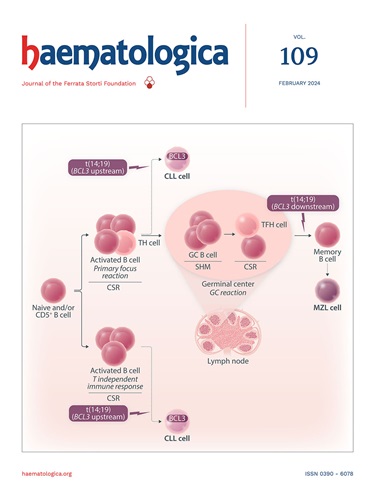患者来源的三维肝类器官严重凝血因子VII缺乏的体外矫正。
IF 7.9
1区 医学
Q1 HEMATOLOGY
引用次数: 0
摘要
凝血因子(F) VII缺乏是罕见的遗传性出血性疾病中最常见的,主要是由F7基因的错义突变引起的。该病的表型范围从无症状病例到极其严重的出血形式,需要预防性注射血浆源性或重组FVII浓缩物。作为回应,我们开发了一种基于自体细胞的方法,纠正患者来源的诱导多能干细胞(iPSCs)中的致病突变,并产生治疗性的三维肝类器官(HOs)。我们报道了crispr介导的纯合C . 718g >C (p.G240R)的纠正,这是一种与严重的、危及生命的出血表型相关的错义突变。HOs包含所有类型的肝细胞,并表现出关键的肝功能,包括凝血因子的产生。经过校正,我们的数据表明,患者源性HOs分泌的功能性FVII蛋白数量一致,从而提高了凝血酶的生成时间。这些结果代表了FVII和其他凝血因子缺乏症患者建立自体细胞治疗的重要里程碑。本文章由计算机程序翻译,如有差异,请以英文原文为准。
Ex vivo correction of severe coagulation Factor VII deficiency in patient-derived 3D liver organoids.
Coagulation factor (F) VII deficiency is the most frequent among the rare, inherited bleeding disorders and is predominantly caused by missense mutations in the F7 gene. The disease phenotype ranges from asymptomatic cases to extremely severe hemorrhagic forms, requiring prophylactic injections with plasma-derived or recombinant FVII concentrates. In response, we have developed an autologous cell-based approach that corrects the disease-causing mutation in patient-derived induced pluripotent stem cells (iPSCs) and generates therapeutic, three-dimensional hepatic organoids (HOs). We report the CRISPRmediated correction of homozygous c.718G>C (p.G240R), a missense mutation associated with a severe, life-threatening bleeding phenotype. The HOs contain all liver cell types and exhibit key liver functions, including coagulation factor production. After correction, our data indicate that the patient-derived HOs secrete consistent amounts of functional FVII protein, resulting in improved thrombin generation times. These results represent a significant milestone toward the establishment of an autologous cell-based therapy for patients with FVII- and other coagulation factor deficiencies.
求助全文
通过发布文献求助,成功后即可免费获取论文全文。
去求助
来源期刊

Haematologica
医学-血液学
CiteScore
14.10
自引率
2.00%
发文量
349
审稿时长
3-6 weeks
期刊介绍:
Haematologica is a journal that publishes articles within the broad field of hematology. It reports on novel findings in basic, clinical, and translational research.
Scope:
The scope of the journal includes reporting novel research results that:
Have a significant impact on understanding normal hematology or the development of hematological diseases.
Are likely to bring important changes to the diagnosis or treatment of hematological diseases.
 求助内容:
求助内容: 应助结果提醒方式:
应助结果提醒方式:


